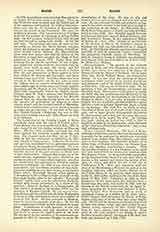

Maillard, OLIVIER, celebrated preacher, b. at Juignac (7), Brittany, about 1430; d. at Toulouse, July 22, 1502. He took the Franciscan habit with the Observants, apparently in the province of Aquitaine. He was there the vicar provincial of the Observant when on June 2, 1487, he was elected Vicar General of the Ultramontane Observants (i.e. those north of the Alps) at the general chapter of the Observants at Toulouse. After his first term of office (1487-90), he was twice reelected (1493-6 and 1499-1502). retiring from office at the General Chapter of May 15, 1502, he went to Toulouse, where he died at the monastery of St. Mary of the Angels. As miracles soon occurred at his grave, the General Chapter of Barcelona in 1508 ordered that his remains should be translated to a chapel built specially for them, where for some time he enjoyed a certain amount of public veneration. He is specially celebrated as a forceful, popular preacher, who preached inspiriting and profitable Lenten sermons in both churches and public places. His manner and style were indeed often rather bluntly plebeian, but by no means so rough as the later classicists have proclaimed them to be. Of a fearless nature, he did not abstain from well-merited attacks upon the abuses of, his time, and upon the crimes of those in high places (e.g. the cruelties of Louis XI). He also espoused the cause of Jeanne de Valois, the repudiated wife of the Duke of Orleans. On the other hand, Maillard, who was highly respected by all classes, confirmed Charles VIII in his plan of restoring Roussillon and Cerdagne to Aragon. Innocent VIII asked Maillard in 1488 to use his best endeavors with the French king for abolishing the Pragmatic Sanction: but in this task he was unsuccessful, like many others.
Of his works, nearly all of which are sermons, there is no complete collection; they appeared in detached fashion, many in various editions and in both French and Latin. The most important are: “Sermones de adventu, quadragesimales et dominicales” (3 vols., Paris, 1497-8, 1506, 1522, etc.; Lyons, 1498, etc.); “Sermones de adventu, quadragesimales, dominicales” and “De peccati stipendio et gratiae, praemio” (Paris, 1498-, 1515, etc.; Lyons, 1503), delivered at Paris in 1498; “Quadragesimale”, delivered at Bruges in 1501 (Paris, s. d.); printed with the author’s notes and the edition of his “Sermon fait l’an 1500.. en la ville de Bruges” (2nd ed., Antwerp, s.d.); “Chansonpiteuse… chantee a Toulouse 1502” (2nd ed., Paris, 1826);
Histoire de la passion.. de nostre doulx sauveur” (Paris, 1493); “La conformite et correspondance tree devote des mysteres de la messe a in passion.” (Paris, 1552), reprinted as a literary monument (Paris, 1828); “L’instruction et consolacion de la vie contemplative” (Paris, s. d.), containing various treatises; “La confession de Frere Olivier Maillard” (Paris, s. d.; Paris, 1500), frequently edited.
MICHAEL BIHL

